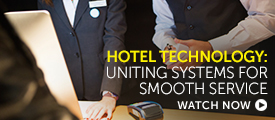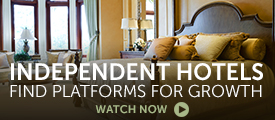A good hotel should run like a well-oiled machine. And of course machines, data systems, and digital platforms are a key part of successful modern businesses. According to a report by Accenture, “77% of executives think that within three years companies will need to focus on training their machines as much as they do on training their people.”
Integration between multiple systems is vital to achieving a seamless consumer experience. In these videos our experts discuss the technology systems used in different areas of hospitality business:
Accenture conducted a survey for its Technology Vision 2015. 2,000 business and IT executives across nine countries and 10 industries were surveyed to gather insights into the adoption of emerging technologies.
The report states that: “81% believe that in the future, industry boundaries will dramatically blur as platforms reshape industries into interconnected ecosystems.”
Industry specific technology platforms are now available to many industries. According to Accenture; “39% of executives say they are now using these industry platforms to integrate data and applications with digital business partners and collaborate, while 35% are currently experimenting with them.”
The report also found that: “81% place the personalized customer experience in their top three priorities for their organization.” This is certainly a key issue in the hospitality industry. In order to achieve this technology need to work seamlessly in real time, and information need to be shared consistently across platforms. One complication is that this may involve passing data to technology business partners and would need to be accepted by the customer. Accenture say that: “67% of individuals are willing to share data with companies, but that percentage drops to 27% if the business is sharing data with a third party.”
People are the centre of any hospitality business. Whilst hardworking technology is vital behind the scenes to be able to offer the services that we need to give, staff will always be needed to connect with guests on a personal level. One final statistic to mention from Accenture’s report is that: “78% believe successful businesses will manage employees alongside intelligent machines— ensuring collaboration between the two.”
If you’ve been sent to this page and you’re not yet on the circulation list to receive these regular briefings and you would like to sign up, you can do see here. It’s free.
Video clips produced by ybc.tv for the Hospitality Channel, including interview from industry conferences such as the IHIF conference as well as specific Hospitality Channel shoots.


